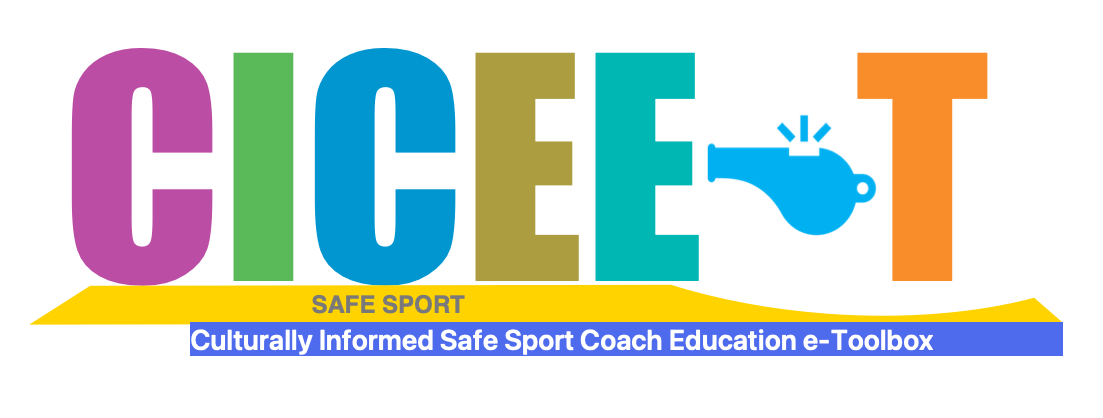
The CICEE-T project partnership will work with the development of the first culturally informed digital coaching education toolbox on safe sport to address the common need of combating psychological, physical, and sexual forms of interpersonal violence in sport in a seemly way for 6 countries of the north Mediterranean region.
The project will attempt to overcome the limitations of the common practice of ‘importing and translating’ centrally developed guidelines (e.g., from IOC, EC, northern EU) with a culturally informed approach delivered in national languages and built bottom up considering key cultural characteristics of the Mediterranean Region partners and the needs of their coaches for Safe Sport coach education.
The project intends to enhance the skills, competences, and knowledge of sport coaches in Cyprus, Greece, Italy, Malta, Spain and Portugal on Safe Sport and safeguarding sport from violence.
Objectives
As violence in sport is a universal phenomenon that is time- and place-bound,
any solutions for the prevention and fight against it must be culturally suitable for the context.
The CICEE-T project has four specific objectives to reach within 36 months:
To develop background knowledge of (a) Safe Sport coach education initiatives in all partner countries, (b) cultural barriers manifested in sport for the Mediterranean Region countries, and (c) beliefs formulating coaches’ intentions for receiving Safe Sport coach education and delivering Safe Sport coaching in the Mediterranean Region countries.
To design and develop the CICEE-T e-toolbox, containing digital culturally informed coach education on Safe Sport for the prevention of violence in sport, an evaluation system for its education outcomes and a monitoring system for its use.
To implement, evaluate and refine the CICEE-T e-toolbox in a pilot study conducted in the Mediterranean Region partner countries.
To evaluate the CICEE-T project impact (process and outcomes) and to disseminate the CICEE-T e-toolbox, steps followed for building it and knowledge/outcomes developed.
ACTIVITIES
The CICEE-T upon recognizing sport coaches as first responders to interpersonal violence in sport, focuses on their education in a culture-friendly way that increases the chances of endorsing the Safe Sport concept and delivering Safe Sport praxis in cultures situated in southern EU.
When Safe Sport ideas are frankly translated into a country’s language without adaptations to its culture, chances for these to be efficiently implemented and transferred to the participants via the coaching practice are weakened.
To develop the CICEE-T e-toolbox, the partners employ the ADDIE model (Analysis, Design, Development, Implementation, and Evaluation).
The main activities that CICEE-T partners will carry out are:

Mapping of Safe Sport coach education initiatives of the Mediterranean Region partners topped with qualitative / quantitative research on Safe Sport cultural barriers manifested in the societies and sport of partner countries along with the beliefs that formulate coaches’ attitudes and intentions for receiving Safe Sport coach education and delivering Safe Sport coaching in the partner countries.
Design and development of e-toolbox, containing digital culturally informed coach education on Safe Sport for the prevention of violence in sport, an evaluation system for its education outcomes and a monitoring system for its use.
Pilot the e-toolbox within the CICEE-T partner countries to implement, evaluate and refine the e-toolbox.

MOVING THE NEEDLE
The main output of CICEE-T project is digital Safe Sport coach education, evaluation, and monitoring, packaged in a e-toolbox with 6 versions. The CICEE-T partners anticipate moving the needle via embracing diversity and using cultural nuances in combating interpersonal violence in sport.
The project will deliver new knowledge on the development and implementation of Safe Sport coach education that is meaningful and applicable to the sport context of partner countries and a stepwise culture-sensitive methodological approach that may be of use to the international community in the fight against interpersonal violence in sport.
International Webinar
News
The Italian Online Webinar on Safe Sport
On May 29th, 2025, CEIPES ETS organized an online webinar within the framework of the CICEE-T project, focusing on the topic of Safe Sport. The event aimed to promote and disseminate the project's goals, share research findings and results, and present one of its core...
Final meeting in Antwerp and International Event
From 5 to 7 May, the CICEE-T project partners met in person in Antwerp, Belgium, hosted by Thomas More University of Applied Sciences. Over two days of intense meetings, the consortium discussed key updates on the project, focusing in particular on the dissemination...
Event promoting safe sport in Palermo
On 10 March 2025, CEIPES organised a promotional event at the Faculty of Sport Sciences of the University of Palermo as part of the European CICEE-T project. The event aimed to engage future coaches, who are about to enter the professional world, in discussions on...
























